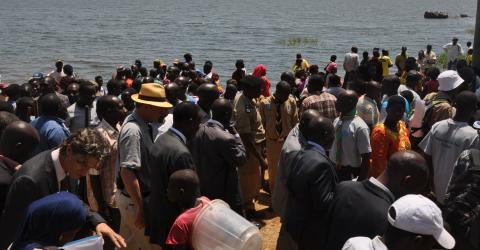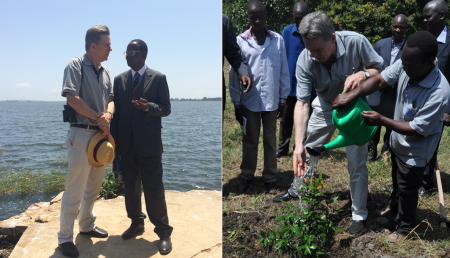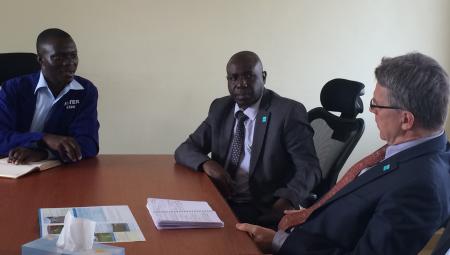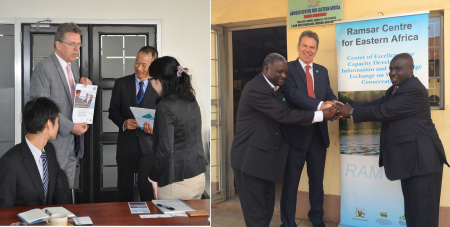
Ramsar Secretary General joins the world from Uganda to celebrate World Wetlands Day
Gland, 13 March 2015
Dr. Christopher Briggs, Secretary General of the Ramsar Convention on Wetlands, joined the rest of the world to celebrate World Wetlands Day on 2nd February at the Lutembe Bay Wetland System, a Ramsar Site of International Importance in Uganda.
Drawing global attention to the vital role of wetlands is important because they are often viewed as wastelands, to be drained, degraded or encroached upon. Latest estimates suggest that 64% of wetlands have been lost worldwide since 1900. The theme for 2015, “Wetlands for our Future”, was therefore selected to focus attention on the current state of the world’s wetlands and to remind the world that urgent action is needed to reverse the current trends.
“World Wetlands Day provides all of us with an opportunity to join together with our colleagues around the world to celebrate the benefits that we all receive from wetlands, and to help raise the awareness of our fellow citizens about the importance of these vital ecosystems for our common future. I am delighted to be seeing how Uganda, which is a key Party to the Ramsar Convention, makes this day special and makes wetlands come alive and leap into people’s imaginations“. Said Dr. Christopher Briggs.
Dr. Briggs was welcomed by Hon. Ephraim Kamuntu, Uganda’s Minister of Water and Environment and over 500 people, mainly youth and local communities who were at the colourful ceremony organized by the Ministry of Water and Environment of Uganda and the Ramsar Centre for Eastern Africa.

The threats to the future of wetlands
The status of Uganda’s wetlands reflects the worrying global trends. Nearly 30% of the country’s wetlands have been lost in the last 10 years. They have been encroached upon or drained due to an increasing population, to make way for an expanding city and climate change which is leading farmers to target wetlands for their water. Furthermore the country’s wetlands have been degraded as a result of waste from extractive industries and poor policy enforcement to tackle encroachment. According to Hon. Ephraim Kamuntu, Uganda’s Minister of Water and Environment “The water quality of Lake Victoria, Africa’s largest fresh water lake in the region, is in decline due to poor practices of wetland management.”
What can be done to reverse the trends and ensure a future with wetlands?
Despite the challenges, Uganda is committed to preserving and restoring its wetlands, which the country recognizes as essential for rain formation, sustaining local livelihoods as well as for filtering and treating waste. As a demonstration of this commitment, the Government of Uganda announced at the end of 2014 the impending cancellation of all land titles issued after 1995, in wetland types which have been identified as a critically endangered ecosystems. Uganda is also one of the countries that are set to benefit from a Global Restoration Partnership set up by Ramsar, that will be financed by the Government of Norway to finance restoration projects within cities.

During his five day stay in Uganda, Dr. Briggs also met with the President of Uganda, His Excellency Mr. Yoweri Kaguta Museveni to discuss the state of wetlands in Uganda and how the Ramsar Convention on Wetlands could support their restoration and wise use in the country. He also met with representatives from Japan International Cooperation Agency (JICA), United Nations Development Programme and officials from the Ministry of Water and the Environment in Uganda. Dr. Briggs also visited Lubigi, Nakivubo and Mabamba, which are important wetland sites in the country and opened the new offices of the Ramsar Center for Eastern Africa.
